Verdicts On Basij Militia Death Confirmed By Iran’s Supreme Court
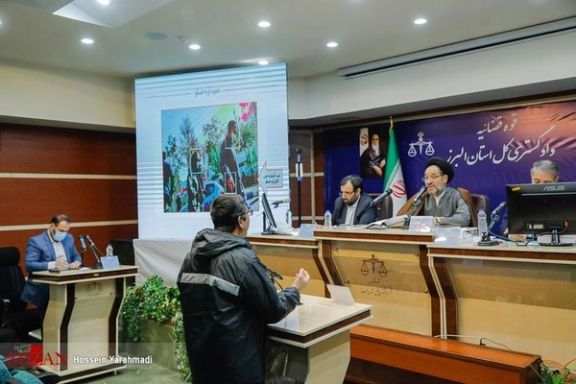
Iran's Supreme Court has upheld verdicts for detained protesters linked to the death of Basij member Rouhollah Ajamian, except for minor protester Arian Farzamnia.

Iran's Supreme Court has upheld verdicts for detained protesters linked to the death of Basij member Rouhollah Ajamian, except for minor protester Arian Farzamnia.
Alborz Province Chief Justice Hossein Fazeli Harkandi confirmed, "The country's Supreme Court has finalized the verdicts for detained protesters tied to Rouhollah Ajamian's death, excluding Arian Farzamnia."
The sentences include harsh penalties. Hamid Qarahasanlou received a 15-year prison term in exile, wich would mean incarceration in a remote region. Reza Aria, Hossein Mohammadi, and Mehdi Mohammadi each got 10 years in prison.
Others involved faced sentences. "Mohammad Amin Akhlaghi Savojbolaghi, Amin Mehdi Shokrollahi, and Farzaneh Qarahasanlou were sentenced to five years in prison in exile. Ali Mozaffari Goodarzi got three years in prison," Chief Fazeli Harkandi stated.
For Arian Farzamnia, under 18, Fazeli Harkandi noted the verdict's medical forensic evaluation by the Supreme Court. A new verdict by the Revolutionary Court of Alborz Province will follow.
This development follows ongoing fairness and transparency concerns in the Ajamian case. Fourteen protestors received up to 15-year sentences, criticized by human rights advocates.
Ajjamian died near Tehran in November, allegedly by a group termed "rioters" by the regime. The Basij militia member suffered fatal assault and humiliation.
Executions of Mohammad Mehdi Karami and Mohammad Hossein in connection with Ajamian's death raised due process concerns. Swift trials without representation were involved.
These events spotlight wider protests across Iran, demanding justice and ending oppressive policies. The regime's harsh response and heavy sentences reflect determination to quell dissent and resist change.
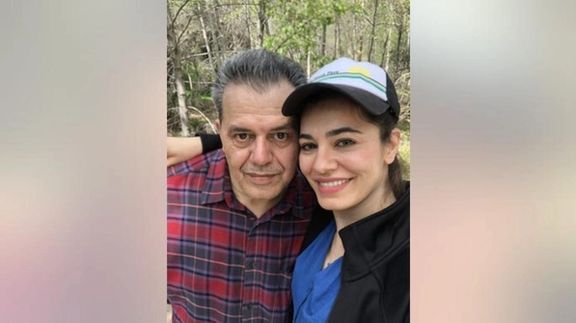
The daughter of German-Iranian Jamshid Sharmahd, who is currently on death row in Iran, pleaded for the United States and Germany to intervene in his case.
Following a sit-in protest outside the US State Department, Gazelle Sharmahd, who lives in California, issued her urgent appeal to officials in Washington. "What I'm asking the US and Germany is to free my father, to bring my father back, to save his life," she said.
This appeal comes in the wake of a recent deal by President Joe Biden's administration, which secured the release of five American citizens incarcerated in Iran.
Sharmahd, 68, a software developer and long-term resident of California, was reportedly abducted during a visit to the United Arab Emirates in 2020 and subsequently transported to Iran against his will. The Iranian judiciary sentenced him to death on charges of "spreading corruption on Earth," a verdict that was upheld by Iran's Supreme Court in April. The family has vehemently rebuffed the allegations and Amnesty International has already condemned his trial as a sham.
Gazelle Sharmahd said she was frustrated by the passing of responsibility between Germany and the US. "It seems like a game of responsibility ping-pong. The issue is tossed back and forth, with each side claiming 'not my citizen,' 'not my jurisdiction.' And we're not getting through to them," she said
Germany has said it is actively involved in the case through its highest channels but Gazelle Sharmahd is convinced that Germany's efforts were only on improving her father's prison conditions.
While denouncing Iran's treatment of Sharmahd as "reprehensible," the US State Department said that that the case falls within Germany's purview as he is their citizen.

An understanding with Iran to eventually release five Americans remains on track, White House National Security Adviser Jake Sullivan said Tuesday but declined to offer any timeline.
Iran on August 10 released four imprisoned US citizens into house arrest, where they joined a fifth already under home confinement, in the first step of a deal under which $6 billion in Iranian funds in South Korea would be unfrozen and the five would eventually be allowed to leave.
"We believe that things are proceeding according to the understanding that we've reached with Iran. I don't have an exact timetable for you because there's steps that need to yet unfold. But we believe that that remains on track," Sullivan told reporters in a conference call.
South Korean media reported Monday the money has already been transferred to the Swiss central bank that would convert the funds to euros and send it to Iranian bank accounts in Qatar. Iran’s foreign ministry said Monday that it would take two months for the hostages to be allowed to leave.
Allowing the five to leave Iran, which could take weeks, would remove a major irritant between Washington and Tehran, which remain at odds on issues from the Iranian nuclear program to Tehran's support for regional Shi'ite militias.
The Iranian Americans who were allowed to leave Iran's Evin prison included businessmen Siamak Namazi, 51, and Emad Shargi, 58, as well as environmentalist Morad Tahbaz, 67, who also has British nationality. The identity of the fourth US citizen who left the prison has not been made public, nor has that of the fifth who was already under house arrest.

Iran’s exiled Prince Reza Pahlavi has made a public appeal to his compatriots encouraging global support for political prisoners in Iran.
Speaking in front of the US State Department, alongside Darin Dalili and Ghazaleh Sharmahd, children of Shabab Dalili and Jamshid Sharmahd, dual-national prisoners in Iran, Prince Pahlavi said that Iranians, regardless of their global location, remain unwavering in solidarity for their fellow citizens, both within and outside the country.
"We will not remain silent and indifferent to decisions or policies that continue such practices,” he said.
Extending further support to all political prisoners Prince Pahlavi appealed to people worldwide to urge governments not to yield to extortion in exchange for the release of captives. He also criticized the practice of unfair hostage negotiation, stating that the value of all human life is equal. This comment comes after Dalili and Sharmahd were left out of a hostage release deal between Iran and the United States, where over $6 billion blocked funds were released in exchange for American detainees.
Dalili, a former captain of Iran Shipping Company and a US resident, was arrested during a trip to Tehran in 2016 for his father's funeral, after which he was apprehended by security forces.
Jamshid Sharmahd, 67, a former resident of the United States, was abducted by Iranian authorities during a trip from Germany to India in August 2020 during a three-day layover in Dubai.
In addition to suppressing dissidents and detaining political activists and journalists abroad, the Islamic Republic has regularly detained foreign or dual-national citizens as hostages to leverage demands against Western nations.
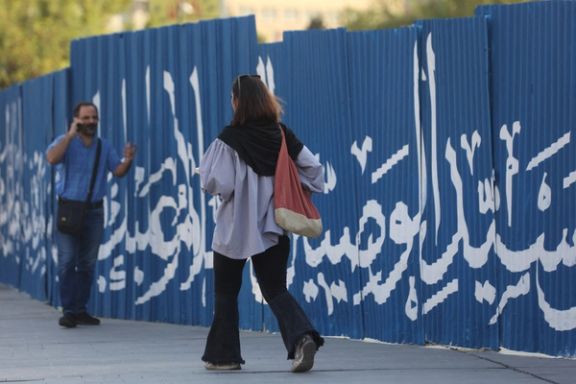
Controversy still surrounds Iran’s new hijab law, with a reformist daily calling it a decision made by 10 parliamentarians for a population of 85 million.
In an article published on Monday, Ham-Mihan newspaper stated, “Only 10 members of the parliament, with a certain political inclination, passed a bill in a week that is expected to impact the lives of 85 million Iranians, including dissidents.”
The paper added that the law will lead to accusations against a significant portion of society over issues related to women's dress code and hijab. Details about the enactment of the new bill are still unknown, as parliament moved earlier in August to make the new hijab regulations even more opaque by approving the regulations without an open session, fearing further backlash.
Iranian lawmakers voted that the bill can be considered under Article 85 of the constitution, which allows the parliament to delegate the bill's approval to an internal committee, effectively sidelining any opposition.
According to Ham-Mihan, the internal committee consists of the same lawmakers who added about 55 articles to the original "Hijab and Chastity" bill, which initially comprised only 15 articles when submitted by the administration of Ebrahim Raisi.
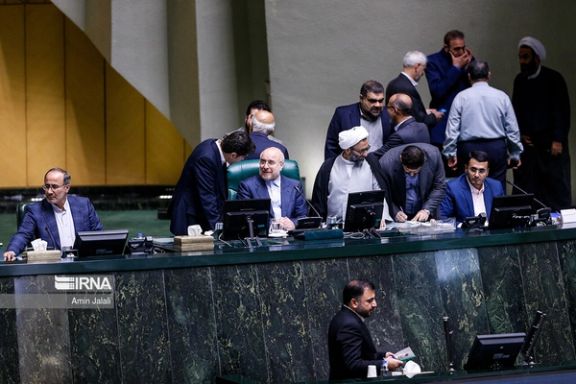
The paper quoted Parliament Speaker Mohammad-Bagher Ghalibaf as saying that discussing a bill with 70 articles in an open session would take a lot of time, especially because about 1,500 points have been suggested by lawmakers to be considered during the discussions. “Some say the parliament is reviewing the bill under Article 85 of the Constitution so that no one understands what is being approved, but this is not true,” Ghalibaf said.
The uprising sparked by the death in police custody of Mahsa Amini in September 2022 has made it increasingly difficult for the clerical regime to enforce the mandatory Islamic dress code. Since the beginning of the ‘Women, Life, Freedom’ movement, tens of thousands of girls and women have shed their compulsory hijab. The regime seeks to criminalize hijab defiance, but no branch of government wants to be solely responsible for the complications of such a provocative and risky action in society.
The fate of the hijab bill, which legal experts claim is against the Iranian Constitution and not practical to implement due to the government's limited means, is still in limbo as conflicting reports circulate about the process. But what is clear is that the government has to devote extensive police and other resources to monitor millions of women, stop those who appear without hijab, issue fines or summon them to court.
This means thousands of confrontations in the streets every day between ordinary women and teenage girls with police and special hijab enforcement agents. It was one such confrontation and arrest that led to Mahsa Amini's death and the most serious antigovernment unrest in 44 years.
Some wonder why the regime has chosen to go the extra mile to force hijab on women, risking another round of protests. Hardliners have answered the question, insisting that the clerical regime cannot retreat from the hijab issue, otherwise it will lose its authority to control the society.
Lawmakers are still voicing opinions and disagreements about how the bill should receive its final seal of approval. Apparently, once the committee approves a bill under the particular constitutional provision, the full chamber has no right to alter it. The Guardian Council, which has the right to review all legislation, will probably review the hijab law too.
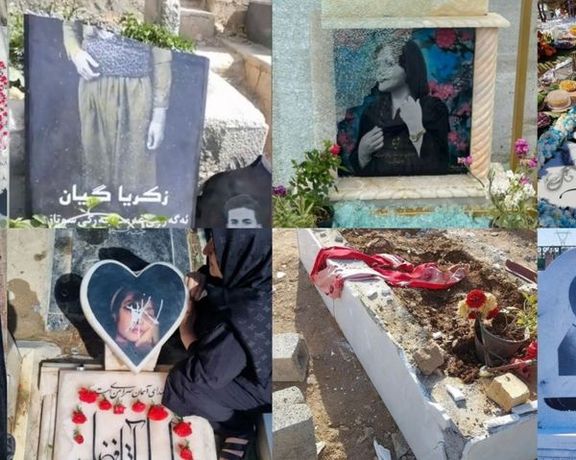
Amnesty International has revealed that the graves of protesters killed during last year’s protests have been vandalized and their families harassed.
The human rights organization's latest research, published Monday, provides concrete evidence of the Iranian authorities' efforts to silence those seeking justice for their loved ones.
The report reveals that graves belonging to more than 20 victims from 17 cities have been vandalized. Graves have been damaged with tar or paint and in some cases set on fire, headstones have been shattered, and inscriptions describing victims as “martyrs” or stating that they died for the cause of freedom have been scraped away. The authorities have also tried to stop victims’ families from holding ceremonies at the graves of their loved ones.
There have not been any official investigations into these acts and in the report, Amnesty International demands immediate action.
"Amnesty International calls on all states to exercise universal jurisdiction and issue arrest warrants for Iranian officials, including those with command responsibility, who are reasonably suspected of criminal responsibility for crimes under international law committed during and in the aftermath of the uprising," urged Diana Eltahawy, Amnesty International’s Deputy Regional Director for the Middle East and North Africa.
Mahsa Amini's family has also faced repeated damage to her grave. The Iranian authorities have announced plans to alter Aichi cemetery in Saqqez, Kurdistan province, where she is buried, limiting public access.
The human rights organization emphasized the international community's responsibility towards protecting the rights of victims' families. These families are subject to arbitrary arrests, unjust prosecutions, coercive interrogations, and unlawful surveillance. The organization demands that the Iranian authorities respect their right to freedom of expression, assembly, and association.






